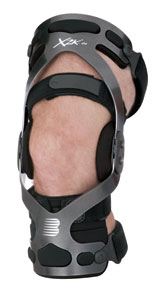The treatment of degenerative arthritis includes:-
- "living with it"
- weight loss, activity modification, physiotherapy
- medications such as painkillers or glucosamine supplements
- knee braces
- injections
- surgery
Living with it
Some patients are found to have X-ray findings of arthritis, but actually have very little or no pain at all. In these cases, especially if activities of daily living are not affected, no treatment may be necessary. It is always important to "treat the patient and not the X-ray".
Exercise
Weight loss, activity modification and sometimes physiotherapy are valuable in the treatment of arthritis. Recent studies show that regular weight bearing exercise (such as walking) done in moderation, actually has a beneficial effect on knee arthritis. Improvements in muscle strength may actually have the effect of reducing loads in the knee, and regular exercise may improve joint position sense ("proprioception") important for avoiding falls and walking properly.
Knee braces
Some patients with mild arthritis may consider wearing a knee brace while they walk. These braces are designed to be worn to work, or for daily activities. They apply a gentle opening force on the side of the knee with is narrow, thereby reducing the pressure in the knee slightly, enough in some patients to reduce pain to a tolerable level.

Medications
Simple painkillers like paracetamol (panadol, acetominophen, tylenol) are useful in treating the pain of knee arthritis. Sometimes, stronger painkillers may be required, such as those from the asprin family (ponstan, ibuprofen, volataren, aleve, celebrex, arcoxia, etc). Of course, if the patient's pain is so severe that he or she requires high doses of regular painkillers, long term these medications may lead to unwanted side effects such as gastrointestinal bleeding or kidney problems.
Glucosamine supplements are very popular in the treatment of cartilage problems. Most of the real evidence is in patients who have X-ray proven cartilage thinning and arthritis. Glucosamine has been shown to reduce the pain of arthritis, but there is little if any convincing evidence that it makes cartilage "grow back". Nonetheless, it has been shown to be safe and useful in reducing arthritis pain.
Injections
Simple steroid injections may be useful in reducing sudden painful swelling and "flares" that can occur in knee arthritis. There are also some newer medications that can be injected into the knee to improve lubrication (viscosupplementation). You should discuss these options with your doctor.
Back to main patient information.
Back to degenerative knee arthritis
Degenerative knee arthritis - surgical options
